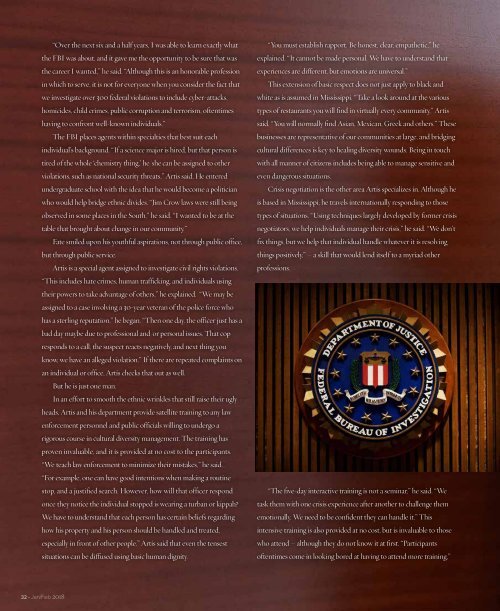You also want an ePaper? Increase the reach of your titles
YUMPU automatically turns print PDFs into web optimized ePapers that Google loves.
“Over the next six and a half years, I was able to learn exactly what<br />
the FBI was about, and it gave me the opportunity to be sure that was<br />
the career I wanted,” he said. “Although this is an honorable profession<br />
in which to serve, it is not for everyone when you consider the fact that<br />
we investigate over 300 federal violations to include cyber-attacks,<br />
homicides, child crimes, public corruption and terrorism, oftentimes<br />
having to confront well-known individuals.”<br />
The FBI places agents within specialties that best suit each<br />
individual’s background. “If a science major is hired, but that person is<br />
tired of the whole ‘chemistry thing,’ he/she can be assigned to other<br />
violations, such as national security threats,” Artis said. He entered<br />
undergraduate school with the idea that he would become a politician<br />
who would help bridge ethnic divides. “Jim Crow laws were still being<br />
observed in some places in the South,” he said. “I wanted to be at the<br />
table that brought about change in our community.”<br />
Fate smiled upon his youthful aspirations, not through public office,<br />
but through public service.<br />
Artis is a special agent assigned to investigate civil rights violations.<br />
“This includes hate crimes, human trafficking, and individuals using<br />
their powers to take advantage of others,” he explained. “We may be<br />
assigned to a case involving a 30-year veteran of the police force who<br />
has a sterling reputation,” he began. “Then one day, the officer just has a<br />
bad day maybe due to professional and/or personal issues. That cop<br />
responds to a call, the suspect reacts negatively, and next thing you<br />
know, we have an alleged violation.” If there are repeated complaints on<br />
an individual or office, Artis checks that out as well.<br />
But he is just one man.<br />
In an effort to smooth the ethnic wrinkles that still raise their ugly<br />
heads, Artis and his department provide satellite training to any law<br />
enforcement personnel and public officials willing to undergo a<br />
rigorous course in cultural diversity management. The training has<br />
proven invaluable, and it is provided at no cost to the participants.<br />
“We teach law enforcement to minimize their mistakes,” he said.<br />
“For example, one can have good intentions when making a routine<br />
stop, and a justified search. However, how will that officer respond<br />
once they notice the individual stopped is wearing a turban or kippah?<br />
We have to understand that each person has certain beliefs regarding<br />
how his property and his person should be handled and treated,<br />
especially in front of other people.” Artis said that even the tensest<br />
situations can be diffused using basic human dignity.<br />
“You must establish rapport. Be honest, clear, empathetic,” he<br />
explained. “It cannot be made personal. We have to understand that<br />
experiences are different, but emotions are universal.”<br />
This extension of basic respect does not just apply to black and<br />
white as is assumed in Mississippi. “Take a look around at the various<br />
types of restaurants you will find in virtually every community,” Artis<br />
said. “You will normally find Asian, Mexican, Greek and others.” These<br />
businesses are representative of our communities at large, and bridging<br />
cultural differences is key to healing diversity wounds. Being in touch<br />
with all manner of citizens includes being able to manage sensitive and<br />
even dangerous situations.<br />
Crisis negotiation is the other area Artis specializes in. Although he<br />
is based in Mississippi, he travels internationally responding to those<br />
types of situations. “Using techniques largely developed by former crisis<br />
negotiators, we help individuals manage their crisis,” he said. “We don’t<br />
fix things, but we help that individual handle whatever it is resolving<br />
things positively,” – a skill that would lend itself to a myriad other<br />
professions.<br />
“The five-day interactive training is not a seminar,” he said. “We<br />
task them with one crisis experience after another to challenge them<br />
emotionally. We need to be confident they can handle it.” This<br />
intensive training is also provided at no cost, but is invaluable to those<br />
who attend – although they do not know it at first. “Participants<br />
oftentimes come in looking bored at having to attend more training,”<br />
32 • Jan/Feb <strong>2018</strong>

















